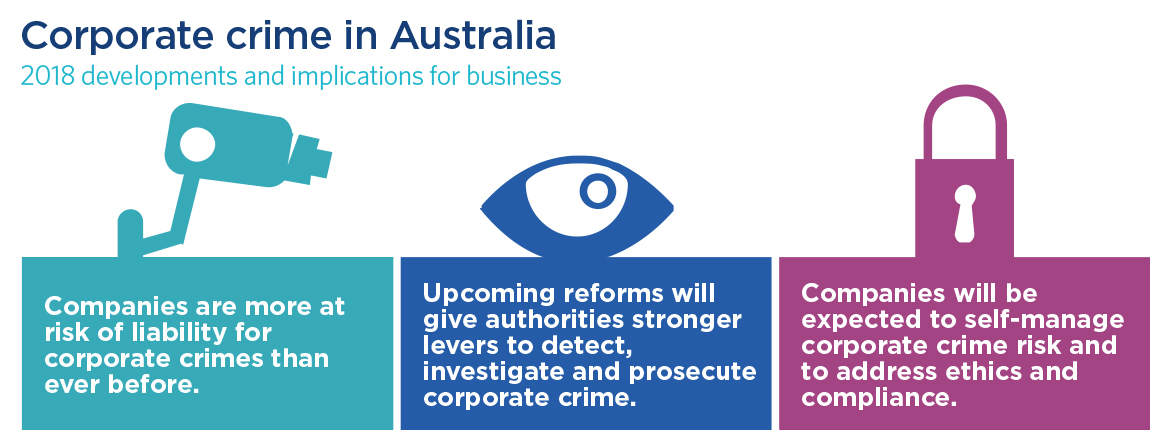Proposed Australian regulatory developments place a higher onus on Australian businesses to self-manage corporate crime risk, and to have in place robust systems to address ethics and compliance within their organisations.
Key takeaways for Australian companies
- Companies are more at risk of liability for corporate crimes like foreign bribery than ever before.
- Regulatory reforms will provide authorities with stronger levers to detect, investigate and prosecute corporate crime.
- There is a higher onus on companies to self-manage corporate crime risk, and to have in place robust systems to address ethics and compliance within their organisations.
The proposed regulatory developments in a nutshell
- Deferred Prosecution Agreements are coming, giving prosecutors new tools to get enforcement outcomes.
- Proposed laws will make companies strictly liable for ‘failing to prevent’ foreign bribery by associates.
- Whistleblowing reforms are set to encourage reporting.
We explore these reforms, and implications for business, in this article. We also look at what regulators are likely to focus on over 2018 and beyond, given the latest OECD commentary in December 2017 on Australia’s track record in enforcing foreign bribery and related offences.
Investigations and prosecutions remain a key focus
For authorities, demonstrating Australia is serious about tackling corporate crime has been a priority since the OECD sharply criticised Australia’s foreign bribery enforcement in 2012.
The legacy of that criticism can be clearly seen in the Australian Government’s initiatives to build the anti-corruption capabilities of the Australia Federal Police (AFP), the launch of a coordinated Fraud and Anti-Corruption Centre, and the overall rise in investigations since that time.
Currently, the number of foreign bribery investigations remains steady, with matters inching closer to prosecutions. Latest figures from the December 2017 OECD evaluation indicated the AFP has 19 active foreign bribery investigations and 13 matters under evaluation. An additional 3 matters have been referred to prosecutors.
2017 saw the first individuals convicted for foreign bribery offences in Australia, with 3 individuals now serving jail time for bribes paid to secure construction contracts in Iraq.
Beyond the foreign bribery space, 2 prosecutions also commenced in recent months against individuals for breaches of UN sanctions against Iran and North Korea.
Moves to enforce corruption and sanctions laws has been similarly rivalled by the focus on anti-money laundering regulation, with the second landmark action by AUSTRAC commenced in the last year.
Making it easier to detect wrongdoing
In conjunction with this flurry of activity, the Australian Government has continued to explore barriers to successful enforcement, and what regulatory levers can be pulled to aid enforcement outcomes. One key area of weakness remains detection, with a number of changes designed to facilitate authorities to detect potential wrongdoing.
This has included the release in December 2017 of guidelines on self-reporting of foreign bribery by the AFP and Commonwealth prosecutors. To date, just under 10% of foreign bribery investigations have resulted from self-reports. The guidelines seek to encourage a higher rate of self-reporting by providing greater clarity for companies on how any self-report will affect a subsequent investigation and be taken into account in a decision whether to prosecute (or any sentencing by a Court).
In addition, new whistleblowing laws extending protections in the private sector are designed to encourage reporting. Authorities see whistleblowing as a major vehicle to detect possible wrongdoing, although in the current environment, rates of whistleblowing are relatively low. The December 2017 OECD report suggests that around 3 foreign bribery investigations (or around 5%) commenced with information from whistleblowers, and another 8 were detected by the media (presumably with the assistance of whistleblowers and other sources). Whether the proposed legislative protections will be sufficient to increase the rates of whistleblowing remains to be seen.
Regardless of that outcome, new whistleblowing laws mean the spotlight will be on company internal whistleblowing processes to ensure that reports are handled appropriately and organisations have an opportunity to investigate and remediate issues, before reports are made to regulators or the media. Companies will also need to ensure their whistleblowing policies comply with new legal requirements.

What else is going to change in 2018?
Two other measures will likely become law in 2018, each with significant implications for businesses seeking to manage their corporate compliance exposure.
If the Government’s law reform agenda is passed through Parliament, not only will whistleblowing laws make it easier for authorities to learn of potential wrongdoing, but changes like the new ‘failure to prevent bribery’ offence and the introduction of Deferred Prosecution Agreements (DPAs) will make it easier for investigators and prosecutors to achieve enforcement outcomes.
Under the proposed ‘failure to prevent bribery’ offence, companies would be strictly liable for foreign bribery committed by ‘associates’ unless they can show adequate procedures were in place to prevent bribery. This new offence would substantially extend corporate liability, holding companies to account for the acts of subsidiaries (whether onshore or offshore), as well as entities like distributors and sales agents who ‘perform services for or on behalf of’ the company.
The proposed introduction of DPAs is the third limb of the Australian Government’s reform package. DPAs would provide authorities (and companies) with a route to resolving investigations through a negotiated process, payment of a financial penalty and other agreed conditions. These conditions would include a requirement to cooperate in ongoing investigations and prosecutions of individuals, and the implementation of improvements to a company’s compliance systems.
What’s next on the law enforcement agenda?
Despite these efforts, there is continuing pressure on Australian authorities to translate allegations into investigations, and to convert investigations into enforcement outcomes. The December 2017 OECD evaluation hints at 3 areas where attention is likely to turn next, as authorities continue to grapple with pressure to harden the enforcement climate.
First, authorities will likely continue to explore various avenues to pursue charges, including the use of false accounting offences to prosecute bribery matters, and other Corporations Act provisions. For companies, it means they can face parallel inquiries from ASIC and the AFP, and multiple areas of potential exposure.
Second, the focus for authorities seems likely to increasingly turn not only to detecting bribe payments but also to money flows around bribes. This has significant implications not only for Australian banks and other players in the financial system, but also for companies with foreign interests and investments who may be at risk of receiving proceeds allegedly derived from international bribery and corruption.
The AFP indicate that they routinely consider the potential use of money-laundering offences as part of any investigation. For instance, the initial charges in last year’s Iraqi construction foreign bribery prosecutions included money-laundering offences, although prosecutors ultimately elected to pursue only the bribery-related charges.
Finally, Australian authorities will likely continue to focus on ways to improve coordination between agencies, as they piece together evidence and information which might lead to enforcement outcomes. The Fraud and Anti-Corruption Centre (and the joint agency approach it reflects) has contributed materially to improving the capabilities and effectiveness of investigators.
However, the OECD evaluation suggests that even greater coordination between agencies could have a marked influence on the number of matters being considered for investigation. Although a number of foreign bribery matters have been referred through to the AFP by the Department of Foreign Affairs and Trade, only 2 were referred through Austrade, 1 from the Export Finance and Investment Corporation, and – perhaps most strikingly – none from any of the Department of Defence, the Australian Tax Office or the AML/CTF system. Given these comments, each of these agencies will undoubtedly be on heightened alert to ensure any potential foreign bribery referrals are conveyed to the AFP in the future.
Key dates
The proposed laws are currently before Senate committees for consideration, with reports expected in March and April.
We will report on developments as these reports are released.
This article first appeared in Lawyers Weekly on Friday 2 March, 2018.
Key contacts
Legal Notice
The contents of this publication are for reference purposes only and may not be current as at the date of accessing this publication. They do not constitute legal advice and should not be relied upon as such. Specific legal advice about your specific circumstances should always be sought separately before taking any action based on this publication.
© Herbert Smith Freehills 2024





